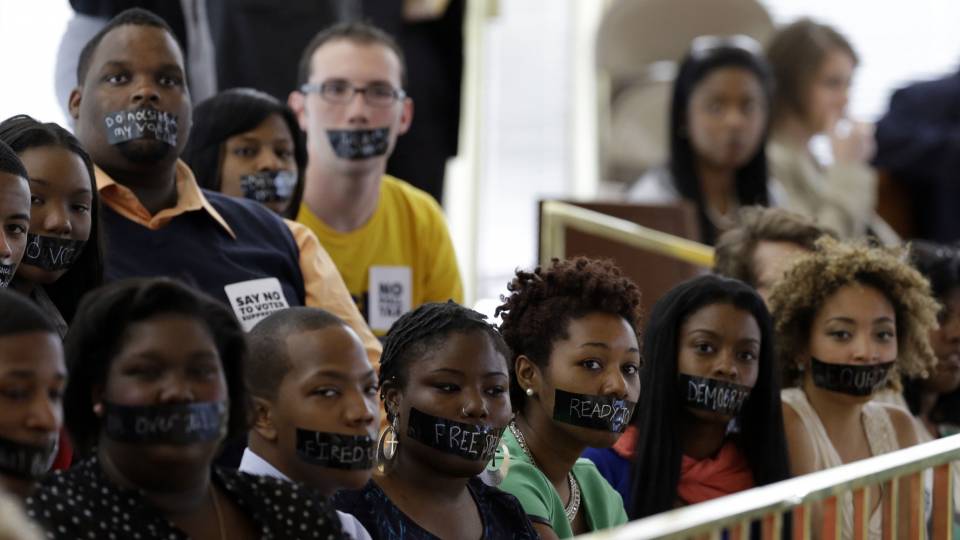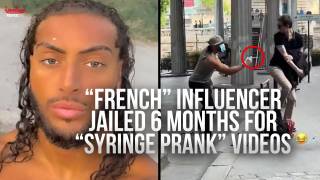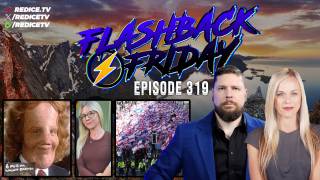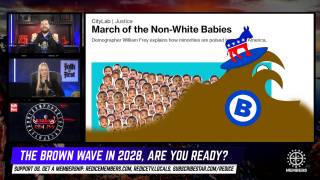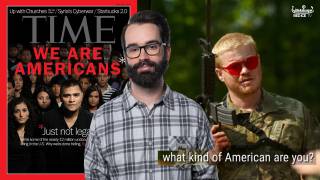US Court Overturns NC Voting Law Requiring ID for Being "Discriminatory" to NonWhites
Editor's Comment: During the presidential election this November, it will be easier than ever for voter impersonation fraud in North Carolina and ofcourse the chance for illegals to vote for Hillary. North Carolina is home to a high amount of illegals. Democrats are already known for hustling illegals and blacks and even paying them to get out and vote. This year they'll be especially motivated to stop Trump and so will illegals.
Black interest groups claim that asking for ID is racist against black people! Really. That's because more blacks (and Latinos) don't have a government ID, even when it's issued free. Just claim having government ID is White privilege and get away with not having it. Then, have laws changed to accomodate your laziness. So let's argue taxes are racist to White people since it's mostly White people paying them.
If one cannot muster the strength or resources to go get a government ID, even when free, then they should not be allowed to vote.
The claim that voting laws requiring ID is a targeted attack on black Americans is simply idiotic, selfish and antiWhite. If there was laws aimed against blacks, America would not have affirmative action, scholarships, loans, grants and welfare programs entirely for "minorities." The blatant double standard is that only nonWhites can fight entirely on racial lines for their group's interests.
RALEIGH
The 4th U.S. Circuit Court of Appeals on Friday overturned North Carolina’s 2013 elections law that included a provision requiring voters to show ID at the polls.
The three-judge panel found that the law was adopted with “discriminatory intent.” The case was sent back to U.S. District Judge Thomas Schroeder, who in April issued a 485-page ruling dismissing all claims in the challenge to the state’s sweeping 2013 elections law overhaul.
“In holding that the legislature did not enact the challenged provisions with discriminatory intent, the court seems to have missed the forest in carefully surveying the many trees,” the ruling states. “This failure of perspective led the court to ignore critical facts bearing on legislative intent, including the inextricable link between race and politics in North Carolina.”
The ruling prohibits North Carolina from requiring photo identification from voters in future elections, including the November 2016 general election. It restores a week of early voting and preregistration for 16- and 17-year-olds, and ensures that same-day registration and out-of-precinct voting will remain in effect.
State Board of Elections officials immediately began to pull back advertising campaigns that had been designed to air on TV, radio and other media in the coming months to educate North Carolina voters about what they would need to cast ballots in the coming election.
Challengers of the elections law overhaul shepherded through the Republican-led General Assembly in 2013 and signed into law by Gov. Pat McCrory quickly lauded the ruling. Republican leaders criticized the ruling, using the common refrain that IDs are required to board airplanes, enter federal courthouses, cash checks and more. They announced their plans to appeal.
U.S. Attorney General Loretta Lynch, who leads the U.S. Justice Department that was a party in the lawsuit challenging the law, praised the appellate panel for striking down a law “that the court described in its ruling as ‘one of the largest restrictions of the franchise in modern North Carolina history.’ ” Lynch described the law as one that placed “barriers between citizens and the ballot box.”
“And it sent a message that contradicted some of the most basic principles of our democracy,” Lynch said in her statement. “The ability of Americans to have a voice in the direction of their country – to have a fair and free opportunity to help write the story of this nation – is fundamental to who we are and who we aspire to be. Going forward, the Department of Justice will continue our work to protect that sacred right for all.”
Lynch and many others echoed phrases from several lines in the 83-page ruling that bats back contentions by advocates of the law who claimed IDs were needed at the polls to prevent voter fraud.
“Although the new provisions target African Americans with almost surgical precision, they constitute inept remedies for the problems assertedly justifying them and, in fact, impose cures for problems that did not exist,” the 4th Circuit judges wrote.
“This ruling is a stinging rebuke of the state’s attempt to undermine African-American voter participation, which had surged over the last decade,” said Dale Ho, director of the ACLU’s Voting Rights Project. “It is a major victory for North Carolina voters and for voting rights.”
N.C. Senate leader Phil Berger, a Republican from Rockingham County, and state House Speaker Tim Moore, a Republican from Cleveland County, issued a joint statement questioning the motives of the three-judge panel — Judge Diana Motz, a Bill Clinton appointee, Judge James A Wynn Jr., a Barack Obama appointee, and Judge Henry F. Floyd, an Obama appointee to the 4th circuit bench but a George W. Bush appointee to the U.S. District bench.
“Since today’s decision by three partisan Democrats ignores legal precedent, ignores the fact that other federal courts have used North Carolina's law as a model, and ignores the fact that a majority of other states have similar protections in place, we can only wonder if the intent is to reopen the door for voter fraud, potentially allowing fellow Democrat politicians like Hillary Clinton and Roy Cooper to steal the election. We will obviously be appealing this politically-motivated decision to the Supreme Court,” Berger and Moore said.
“The voter ID law ensures any North Carolina citizen who wants to vote will have that opportunity,” Berger and Moore contended. “The law establishes a list of valid government-issued photo IDs that voters can present at their polling places, allows anyone without a photo ID to obtain one at no cost through the Department of Motor Vehicles, and allows anyone who still has difficulty obtaining a valid ID to fill out a reasonable impediment affidavit and still have their vote counted. It also brings North Carolina into the mainstream of other states on matters of same-day registration and out-of-precinct voting.”
McCrory, in his statement, accused “three Democratic judges” of “undermining the integrity of our elections while also maligning our state.”
Other Voter ID rulings
The 4th Circuit ruling was the third voting rights decision issued during the past two weeks.
The first decision was in Wisconsin, where a federal district judge found the state’s ID law too restrictive.
Then the full 5th U.S. Circuit appeals court found that Texas’s voter ID law violated the Voting Rights Act by making it more difficult for minorities to vote and opened the door for putting the state under federal supervision again.
“We applaud the appeals court for recognizing the discriminatory intent behind the monster voter suppression law,” Bob Hall, director of Democracy NC, a voting rights organization, said in a statement about the N.C. case. “The ruling makes clear that the North Carolina General Assembly cherry-picked the law to suppress African American and young voters because of the 2008 election. Today’s ruling begins to right that wrong.”
In North Carolina, the state could ask the full bench of the 4th Circuit to review the ruling. But some speculate that even if the full court agreed to review the case, there would not be a restoration of the voter ID requirement and other election law changes blocked by the three-judge panel before the November elections.
“Because of this ruling, North Carolinians will now be able to register and vote free of the obstacles created by the Legislature in 2013,” said Southern Coalition for Social Justice senior attorney Allison Riggs.
Dallas Woodhouse, executive director of the North Carolina Republican Party, questioned whether the law had been defended well. Though N.C. Attorney General Roy Cooper’s office represented lawmakers in the case, Republican leaders also hired private attorneys.
"This is an effort to overthrow the will of the people on voter ID and ballot security, and it is led by the Democrats and, we believe, by Roy Cooper, who did a really lackluster job of defending voter ID while at the same time publicly criticizing it," Woodhouse said Friday afternoon.
But Cooper’s campaign noted that Cooper, the Democrat running for governor, had advised McCrory in 2013 to veto the bill.
North Carolinians were not the only ones commenting on the decision Friday. Hillary Clinton, the Democratic candidate for president, tweeted about it.
Big victory for democracy as the 4th Circuit just struck down a NC voter discrimination law. Let’s keep fighting to make voting easier. -H
— Hillary Clinton (@HillaryClinton) July 29, 2016
The Rev. William J. Barber II, president of the state NAACP and a speaker on the last day of the Democratic National Convention in Philadelphia, was instrumental in challenging the law. It was one of the issues challenged in the Moral Monday movement that grew out of weekly protests at the General Assembly in 2013.
"In 2013, this government took our voting system — which was a model for the nation in encouraging people to vote, not discouraging them — and they made it into the worst voter suppression act in the country,” Barber said. “Today the 4th Circuit’s decision gives North Carolinians back an electoral system that allows the people of North Carolina to vote freely this fall."
In 2015, on the eve of the federal trial over the 2013 law, the legislature softened the ID requirement by adding a provison that allowed voters without one of the six acceptable IDS to cast a provisional ballot if they could show a “reasonable impediment” to obtaining an ID.
Though Motz differed from Wynn and Floyd on whether the time was right to weigh the “reasonable impediment” option, Wynn wrote for the majority: “Nothing in this record shows that the reasonable impediment exception ensures that the photo ID law no longer imposes any lingering burden on African American voters.”
That could be significant for Texas and Wisconsin, where such a softening of the ID requirement was suggested, too.
“This is a very big win for voting rights plaintiffs and the DOJ,” said Rick Hasen, a law professor at the University of California-Irvine who writes about the laws of politics and the politics of law on his electionlawblog.org.
